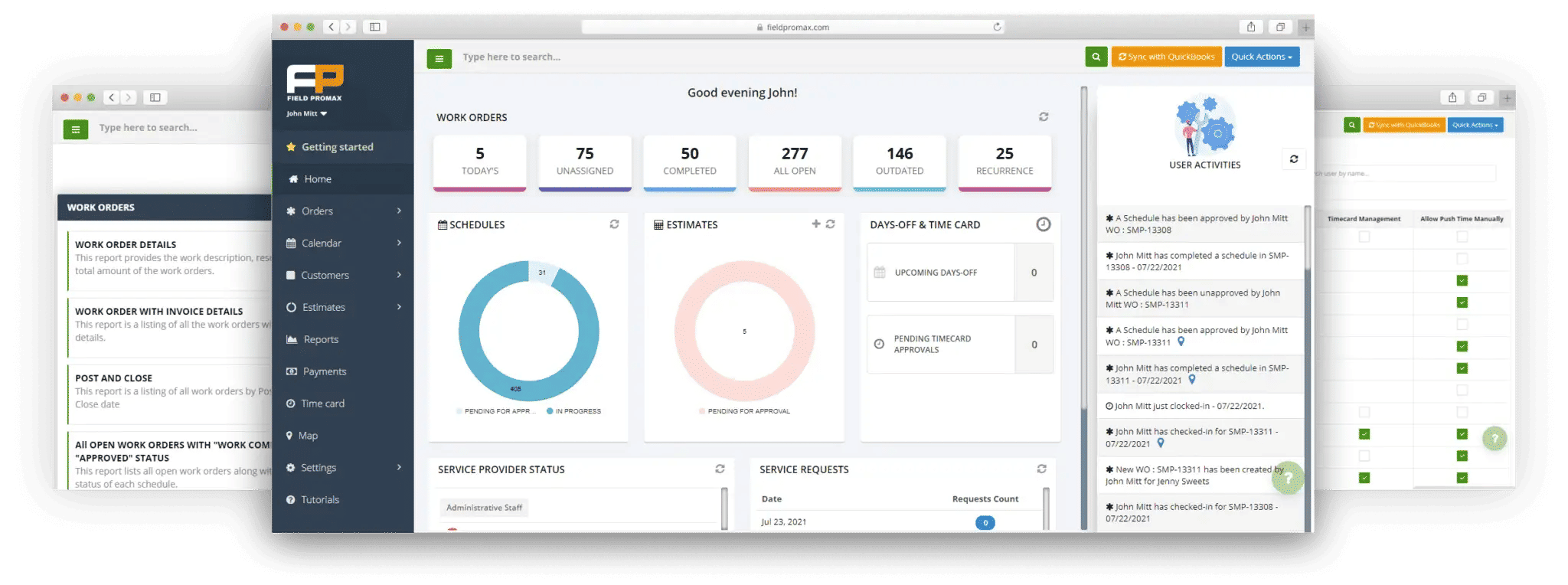Field Service Management Trends for 2025: Keep Up and Keep Moving Your Business Forward

In the last few years, digital transformation has changed the world as we know it. Smartphones have brought the whole world into the palm of our hands. And along with that, our daily lives have changed beyond imagination. The economic world is not beyond its scope either. There are visible changes in almost every aspect of conducting business, which applies to service-based companies as well. And so have the trends and predictions in the domain of field service management. If you are one of the professionals in the field, you must be aware of these changing trends, including the emergence of field service management software, and how they might turn your business around.
Want a personalized demo?
See how Field Promax can transform your field operations
The global market for field service is expanding at an accelerating rate. As per recent reports, it is growing at an estimated compound annual growth rate (CAGR) of 16.5%. Naturally, this took time and effort, and digital transformation played a crucial role in this. The days of disjointed, tedious paper-based systems are long gone. Technology has transformed field service management for the better. Especially with the advent of cutting-edge technologies, the traditional methods underwent a complete overhaul, facilitating remote collaboration and tracking. This has been a major boost for the field service industry as well.
As a service business owner, you too can now have full control over all your operations via field team management software and other digital tools. Furthermore, innovations such as automated work order management, incorporating the power of artificial intelligence and machine learning, and even harnessing the power of augmented and virtual reality have ushered in a new era in field service.
To truly understand how AI tackles complex challenges, a machine learning course can provide insight into the algorithms and techniques behind these smart problem-solving systems.
The current trends are visibly improving the field service business. Eventually, field service management also has to keep up with the changing practices. And if you want to stay in the race, you must keep an eye on the trends that will shape the future of this industry going forward. Here are some pivotal trends that field service managers must be aware of today.

1. No-Contact Service and Remote Collaboration
While the idea of “contact-free” service was not new, it was not something field service workers were largely used to. With the advent of widespread smartphone usage and online deliveries, however, people now want everything delivered to their doorstep, without having to entertain business representatives in person, as much as possible. As a result, field technicians are driven towards exploring remote service delivery.
Innovations like artificial intelligence, IoT, and mixed reality have powered this trend. Although physical contact is still necessary for field service, the trend toward remote collaboration could be a major advantage for this industry as well. With a work order management tool, you can organize and keep track of all your jobs, deliver timely service, manage customer expectations, and even take care of invoicing as well. All you need to do is choose the best field service software, and it will do the rest for you.
2. Shift to Automation

Remember the Ford Company’s assembly line? The invention changed the history of humankind. That was when industries started to harness the power of automation to reduce manual labor. With time, we have reached a point where companies like Amazon use robots to work in their inventories.
Similarly, field service is a domain that heavily relies on manual, intensive processes. As a result, it leaves little to no time for someone running the business to spend time on other tasks, such as building relationships with their customers or taking their feedback into account to build a better business framework. However, those are equally important factors to keep your business up and running. The more pressing issue in this regard is that this manually intensive process comes with an extensive amount of back-office operations. This includes confirming appointments, scheduling and dispatching technicians, monitoring daily operations, managing inventory, invoicing, and managing customer expectations—all while juggling schedules and attending last-minute emergency calls.
This is where field service management software comes to your rescue. This type of software is useful in many ways, such as by helping companies organize and understand maintenance data from the past and the present. Another example is matching technicians automatically to open jobs as they come up and then giving the workforce new tasks. Other than these, this incredible innovation automates the usual administrative tasks as well, such as scheduling and dispatching, tracking progress, managing inventory, and invoicing, it does everything for you. It also helps you optimize your resources, thus contributing to your revenue generation as well.
For the best field service software, you can try Field Promax. It also integrates with Intuit QuickBooks, giving you a complete solution for all your automation requirements.
Want a personalized demo?
See how Field Promax can transform your field operations
3. Mobility

Smartphones have become an integral part of our lives. Keeping up with the trend of the increasing popularity of smartphone usage, the field service industry is also embracing the advancement. More precisely, it has become a necessity rather than an option. If your business involves multiple technicians, a dedicated mobile app can give them more freedom and convenience to deliver their tasks. All the top field service management software now offers its own mobile app versions.
With one of these, your technicians can check their schedule on the go, receive directions to the customer’s location, keep track of parts used, and maintain a log of their tasks. The wealth of information, in turn, allows the business owner to track and monitor all the technicians, work orders, schedules, and everything else they need to have complete control over the service delivery. Field team management software and mobile apps like Field Promax integrate with QuickBooks. The integration allows you to easily manage your work orders while converting them into invoices in QuickBooks.
4. Cashless Transaction
The popularity of cashless transactions has been one of the most notable changes in the last few years. People are now using more modes of digital payment rather than handling cash. Keeping up with the trend, the use of currency has also decreased within B2B transactions as well. Besides, mobile payments offer customers more convenience and safety than cash or physical cards. Naturally, customers now prefer to pay service technicians or companies using credit cards, or even better, via their smartphones.
Considering the change, more and more service companies are now facilitating digital payments for their customers. Organizations that can’t invest in contactless card readers can enable mobile payments in other ways. For example, customers could pay online through a secure portal on the company website or smartphone applications, or a third-party payment processor with brands like PayPal, Square, or Stripe.
5. Predictive Maintenance
No longer can the management of modern fleets and other field service equipment be left to chance. The run-to-failure model is no longer useful or smart from a business point of view. Calls from the field shouldn’t be dealt with in a reactive or even proactive way. What if it was able to tell the future?
The Industrial Internet of Things (IIoT) is making a huge difference for field-service providers and making it possible for maintenance to be truly planned ahead of time. This is done by the following:
- Helping companies waste less time on proactive field calls that sometimes don’t need to be made.
- Allowing maintenance workers more time to answer important calls.Making sure that equipment lasts longer and costs less to keep up.
- Making sure that engineers who plan ahead for maintenance have the right information so they can find the problem and start working right away.
Predictive maintenance is a big plus for both the client and the service provider. Customers benefit because they have fewer service calls, and their important equipment lasts longer. Field service providers can spend more time on tasks that add value and less time on service calls that aren’t needed and the paperwork that goes with them.
Final Words

These are just a few trends influencing the changes in field service. However, the possibilities are limitless. With the rapid growth of technology and the incessant innovations, it is tricky to forecast what will be the next major aspect changing the course of field service. All we can say is that these changes are all driven by customer expectations and the demand for convenience on the part of the service providers. Field service management software solutions are definitely one of the leading drivers of changing practices in this domain. It is leading the way by leveraging cutting-edge technologies such as machine learning, AI, IoT, mixed reality, and so on.
Top field service management software like Field Promax delivers the most innovative and robust applications available today. They are constantly refining and redesigning to meet the evolving demands of the field service industry and help the business owners satisfy the customer expectations, which in turn increases customer conversion, retention, and revenue generation.
Thanks to these 2023 trends, the future of field service may not even be limited to where you can drive or fly. Wise investments could result in a vastly larger sales territory, faster responses, and more loyal customers. Therefore, if you don’t want to miss out on the opportunities that the market gives you, get in touch with us today.
For more information, contact Field Promax
We're here to help you get started